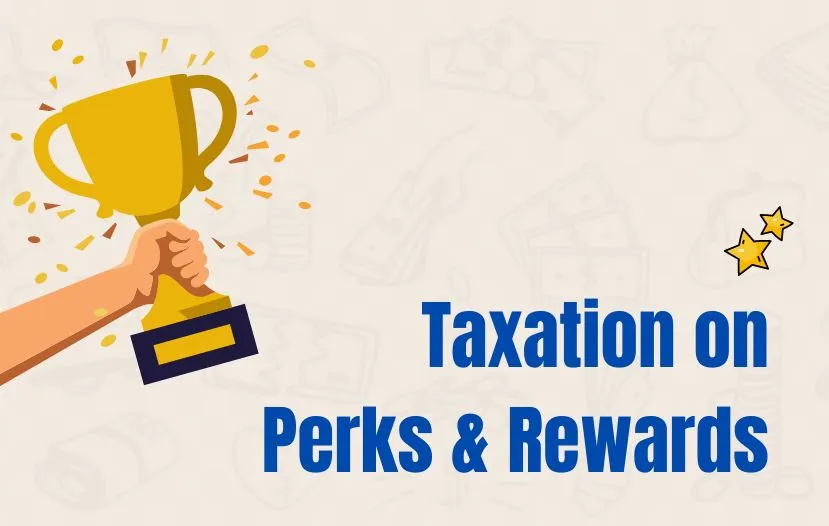Taxation on Perquisites and Rewards
In today’s corporate landscape, employees often receive more than just their salaries in the form of perks and rewards, known as perquisites. Perquisites refer to additional benefits an individual receives alongside their salary, based on their official position. These perks can be taxable or non-taxable depending on their nature, ensuring transparency in financial reporting. Understanding the taxation rules surrounding these perks is essential for both employers and employees to ensure compliance.
Taxation on Perks and Rewards
Under Section 17(2) of the Income-tax Act, perquisites include various elements such as:
- The value of accommodation provided by the employer without charge or at a reduced rent.
- Any payment made by the employer for an expense that should have been paid by the employee.
- The value of any benefit or facility provided free of charge or at a reduced rate to specified employees.
- The value of specified securities or sweat equity shares given by the employer, directly or indirectly, to the employee for free or at a reduced rate.
- Any contribution made by the employer to an approved superannuation fund for the employee, exceeding ₹7.5 lakh per annum, considering the total employer contributions to the recognized provident fund, NPS, and superannuation fund together.
- The value of any other fringe benefit or facility as determined by the rules under the Act.
Categories of Perquisites
1. Taxable Perquisites
These include benefits that are fully taxable in the hands of the employee, such as:
- Rent-free accommodation or housing at concessional rent.
- Utility bills, domestic servants, or driver salaries paid by the employer.
- Employer-paid medical expenses not covered under exemptions.
- Reimbursement of personal expenses or professional tax payments by the employer.
- Motor car facilities used for personal or mixed (official + personal) purposes — taxable as per Rule 3 of the Income-tax Rules, 1962.
2. Exempt Perquisites
Some benefits provided by employers are exempt from tax either fully or partially. These include:
- Medical services are provided to an employee or their family in a hospital maintained by the employer.
- Expenses incurred by the employee or family for treatment of prescribed diseases in a government or approved hospital.
- Health insurance premiums are paid by the employer for an employee or their family.
- Medical treatment outside India, including travel and stay, within limits approved by the Reserve Bank of India (RBI).
- Use of employer-provided telephone, laptop, or computer for official purposes.
- Refreshments are provided during business hours, and recreational or health facilities are provided uniformly to all employees.
- Interest-free or concessional loans up to ₹20,000 or for specified medical purposes.
Perquisites Exclusively Taxable by Specified Employees
Certain perquisites are taxable only if the employee is a specified employee, i.e.:
1. A director of the company,
2. A person holding 20% or more equity voting power, or
3. A person with income under “Salaries” exceeding ₹50,000 (excluding non-monetary benefits).
Such perquisites include:
- Services of domestic help, watchmen, or gardeners.
- Employer-owned cars used for personal or family use.
- Free or subsidized educational facilities for the employee’s children.
Benefits of Perquisites
Perquisites are not just add-ons—they serve strategic and motivational purposes within an organization. They:
- Enhance employee productivity.
- Foster greater staff loyalty and satisfaction.
- Improve retention rates by providing lifestyle benefits.
- Attract top-tier talent in competitive job markets.
Taxation on Perquisites under the Income-tax Act, 1961
According to the Finance Act, 2005 (and continuing under present law), perquisites provided by employers to employees are treated as taxable income under the head “Salaries.” These are added to the employee’s total income and taxed at the applicable slab rates.
As per Rule 3 of the Income-tax Rules, the valuation of perquisites depends on their nature and use (personal or official). The employer is responsible for deducting TDS on the value of such perquisites, but the tax liability rests with the employee.
How Are Taxes on Perquisites Calculated?
Tax on perquisites is calculated based on the prevailing tax rates for the relevant financial year, the total income declared under “Salaries,” and the fair value of benefits determined as per Rule 3 of the Income-tax Rules, 1962.
Medical Facilities Exempt from Tax
Certain medical benefits continue to enjoy tax exemption under the current rules:
- Medical services are provided in a hospital maintained by the employer.
- Expenses incurred for treatment of specified diseases in a government or approved hospital.
- Employer-paid premiums for health insurance or medical policies.
- Medical treatment outside India, to the extent permitted by law.
However, note that the earlier blanket exemption of ₹15,000 per annum for medical reimbursement has been withdrawn from FY 2018–19 onwards.
Conclusion
Understanding the taxation of perks and rewards is essential for both employers and employees. While perquisites enhance job satisfaction and retention, they also have tax implications that must be carefully managed. At Uniqey by JJ Tax, our experts simplify these complexities with practical guidance and personalized tax planning, ensuring you get the best of both compliance and convenience


